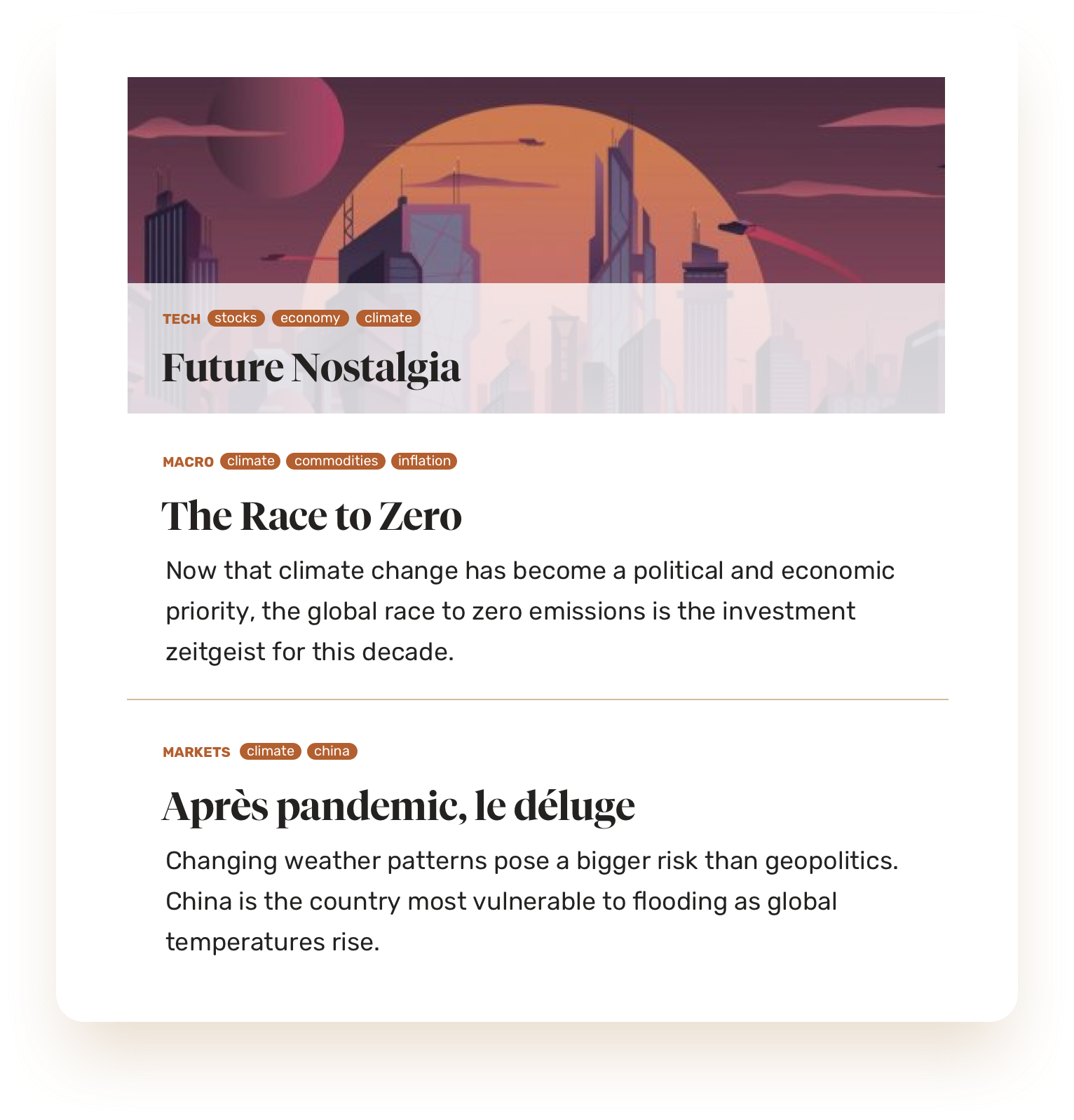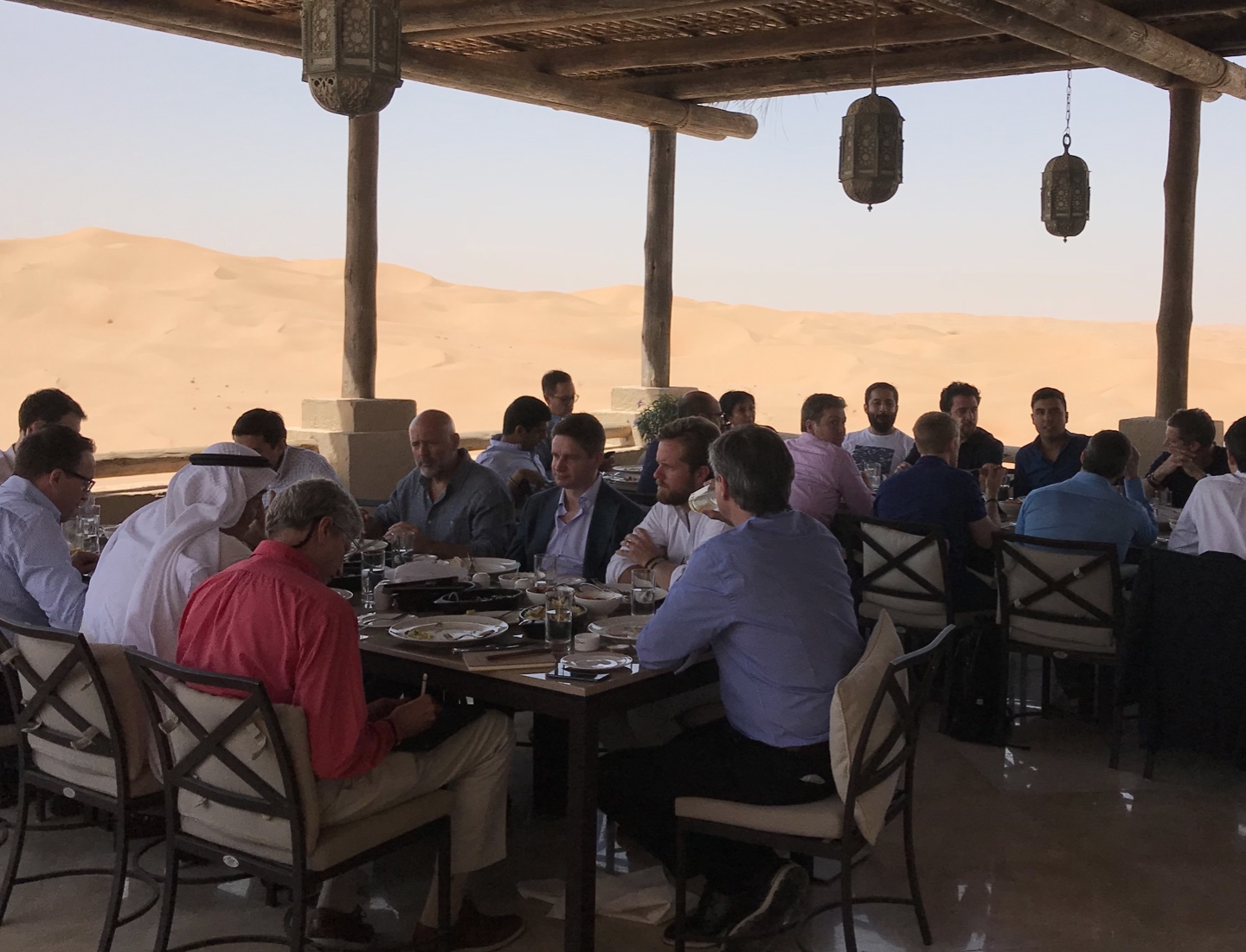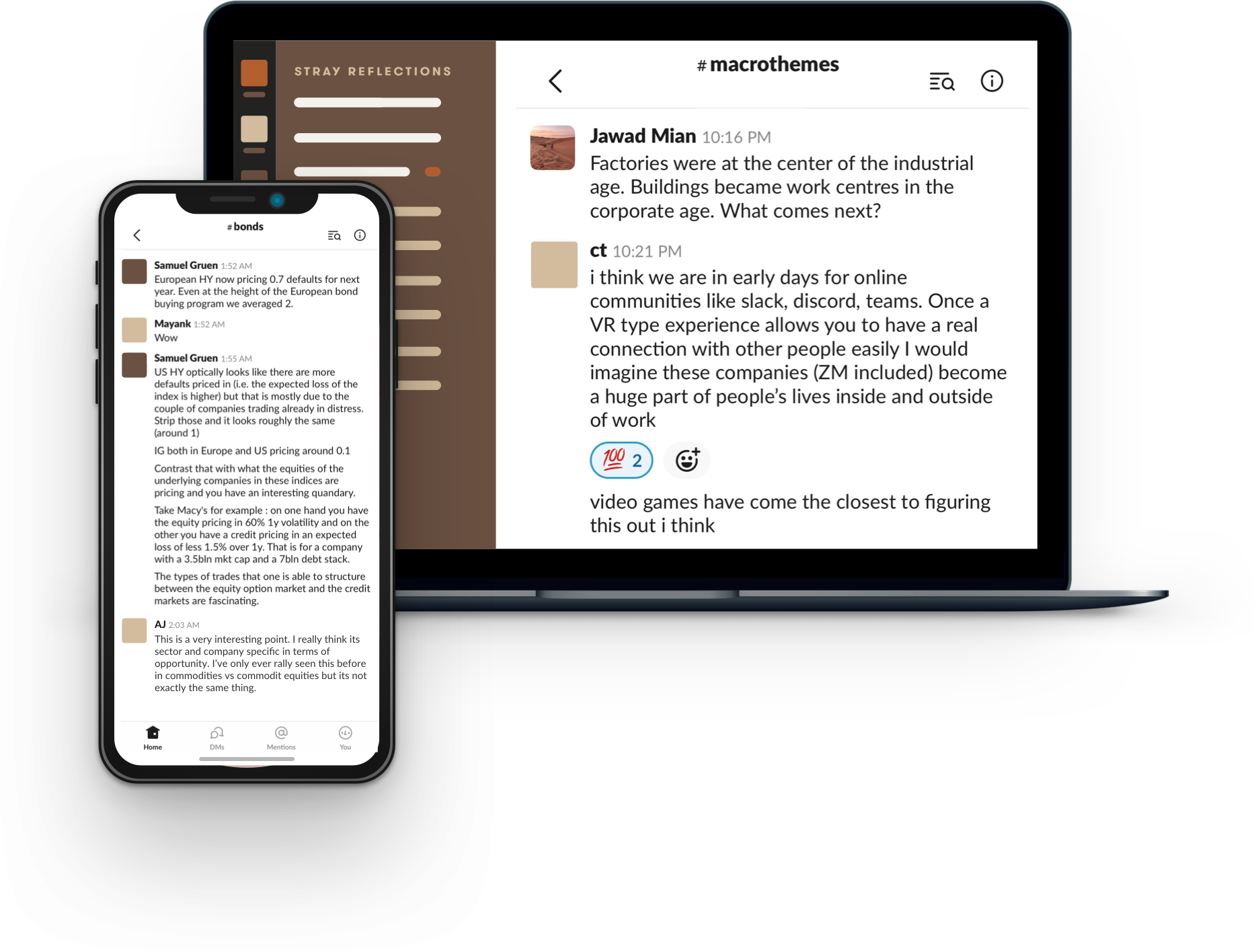Putting our heads together is what Stray Reflections does best. Here’s a summary of the most helpful insights gained from the community last month.
1. Long Awareness
Steven Cohen, CEO of Point 72 Asset Management, offered Stray Reflections’ members an exclusive glimpse at how he approaches his craft. You can watch the full interview here.
TE (New York): Enjoyed it this morning. Feel like the takeaways can be very personal, like a book where people can read the same thing and get different things from it. You hear what you are ready to hear when you are ready to hear it. You hear what you need to hear when you need to hear it.
What resonated with me at this point in the journey was….
When it’s not working (and that’s always gonna happen). Why is it not working? Is it something I’m doing?
Has something changed in market? Should I be focused in other places? I think the latter is the issue for me—tend to be too narrow in “this is what I do.”
Where is it happening now? More importantly, where is it happening tomorrow? What’s next? Crypto? Gotta pay to learn. Size accordingly to learn, and then scale.
Always thought skills I had were narrow—they are not. Limiting belief!
DS (LA): I found the conversation about mental state during Covid and leaning in, having fun with it to be interesting. Ditto for the mental state and “seeing things as they are.” One of the most relevant problems is not truly facing the reality of the moment.
Enjoyed the bit on three risks: leverage, liquidity, and concentration, as well as being at the table for crypto. Lastly, loved that he had fun hanging with his wife (felt the same way last year), and his curiosity to explore new markets.
DC (London): I was fascinated by the openness of the interview. Many interviewers focus exclusively on career rather than go behind the scenes to understand what makes someone tick. In future double down on this. I think Jawad having a pre-existing relationship made the responses deeper as there was already a foundation of trust.
Couple of specific points resonated with me—mindset of running a business versus a fund, enjoying the most pressurized moments, pay to play (crypto and any other new ideas). Look forward to the next one.
JM (Toronto): I was searching for what makes Steve stand out as an elite performer—and I think we got the answer.
He’s relentless. No different than Federer or Ronaldo or Magnus. Doing his own style, evolving to keep playing at a higher level, staying confident despite setbacks, thriving in chaos, continuing to learn and grow, wanting to be the best—no matter what.
Most people don’t realize how difficult it is to play the game he’s playing; at the level he’s playing for as long as he has and stay at the top. Athletes have a life span of 15-20 years. He’s been at this for over 40 years.
Steve shared a lot of wisdom. He was sincere and didn’t hold back. The humanness of it all was refreshing. “You have to be aware. What’s the conversation going on inside.” He stressed this over and over. “Most people just aren’t aware.”
So much of what Steve said reflects the ethos of this community: to seek the truth, be honest with yourself. Successful investing is only possible with knowledge of oneself.
2. Long Boy Plunger
CD (New York): Took notes from an old magazine article on Jesse Livermore (penned in 1920s). Seems to me he was ahead of his time in his deliberate creation of a work environment to achieve peak performance.
Livermore used a tall ticker board, only visible when standing upright. Reveals his preference for standing to sitting. “They keep him on his feet in an erect position so that he can breathe properly, and his circulation will be unimpeded. The crouched or lounging position assumed by those who sit around the low tickers, is in direct contrast. He is on his feet practically all day.”
He also took short walks in between “intense reading of the tape.” He required time and seclusion to examine, absorb, and digest these facts; to form his conclusions and plan his campaigns.
Livermore needed plenty of sleep and ample time for intense study and reflection in the morning away from a “broker’s office” environment. He went to office in a car (as opposed to train) to avoid conversations. He did not concern himself with other people’s opinions about the market or an industry. He didn’t want to taint his own independently formed views.
He was known to be difficult to reach during market hours. Secretary was under instruction that he was unreachable by telephone at specific times. “He has no time for correspondence. This is in line with his practice of excluding all non-essentials.”
Livermore also took a course in psychology to aid in understanding his own judgments and biases.
3. Short Emotions
JM (Toronto): This is a highly charged and emotional bull market. Important to keep the right mental state. One way to do that is define your horizon and develop your strategy for how to cope with different scenarios. If you get triggered it’s because you likely haven’t thought about what to do in different scenarios. If you imagine and prepare in advance, it should be easier (but still not easy). As I always say, the biggest risk we need to manage is our self.
CT (Austin): After a few different crypto cycles, I’ve learned to embrace the volatility as a natural force of entropy. In nature there are no straight lines yet in investing we crave certainty.
I remember distinctly feeling like I should sell most of my Bitcoin when it crossed $3,000 for the first time in 2017. It was unbelievable. Felt unsustainable. Yet here we are.
Having met hundreds of people who achieved mind-bending riches in the crypto space, the common thread is their conviction. That conviction almost always personifies in the ability to hold assets they believe in for longer than anyone else.
This has always stuck with me and admittedly caused great psychic pain in the depths of 2018. If I had not spent years building a belief in the asset, I would have capitulated.
Unlike anything else, crypto turns investors into traders on the way up and traders into investors on the way down. There’s money to be made both ways, trading and investing, but the key is to know your edge. Without a quantifiable, repeatable edge, our best option is to default to time and let the secular trend do the work (assuming we believe in the long-term potential).
I think the most powerful and profitable question to ask is: what would you be willing to hold onto for the longest period of time?
In five years, our biggest financial regret is going to be not accumulating and holding more of something we are very bullish on—not the price at which we bought at.
SB (Netherlands): We tend to forget the pain in those moments. I have experienced it many times with lots of assets and it remains extremely hard to hold on. We think that we can handle it, when the eventual correction or even bear market comes along. We say to ourselves it will be a good buying opportunity. But when that moment arrives it takes everything not to sell. I had a very hard time in March 2020, even though I was waiting for just such an opportunity. I bought far less than I should have, and it took enormous mental effort and pain to just hold on.
After a selloff in which the crypto market lost nearly $1 trillion at its lows, the discussion continued.
CT (Austin): I think the market is suffering from recency bias in thinking that this will be like March 2020 (quick recovery) rather than February 2018 (protracted decline and consolidation). Having three Fed bazookas after a crash helps as opposed to a tentative Fed meeting coming up.
One thing I’ve noticed over the years is how eager crypto participants are to buy or sell or do something as soon as possible. The dopamine addiction is real, and many don’t realize how close this is to gambling. I see a few weak buy signals for bitcoin but nothing else. As a trader I see no reason to do anything right now as we are not showing any strong trends or range extremes.
There’s an opportunity to reassess long term investment theses. I for one believe in yields, derivatives, asset management and anything else people will pay for in the zero fee/fast transaction world like the current financial world we live in. With Layer 2 coming out in a few weeks on Arbitrum, it should shine more light on that.
The coming months will provide life changing investment opportunities which is what I will be focused on more than day to day price action.
4. Long Proteomics
JM (Toronto): Commercial genome sequencing is being compared to the invention of the microscope in the 1600s which fundamentally altered the course of medical technologies and capabilities forever. Does genomic sequencing represent a paradigm shift in medical technology?
SM (Dublin): Genes tend to get more attention, but proteins might really deserve the limelight. Proteomics has far greater potential than genomics. Going to be one of the hot new themes over the next decade. A slew of recent IPOs and SPACs in this space.
KO (Idaho): Genomics has been an important steppingstone, but proteomics will drive the biggest breakthroughs in biology. Proteomics will tell you what is happening in real time in the body versus genomics which tells you what might happen.
Paraphrasing the CEO of Nautilus, “The genome can be read for $1000 in a couple of days from a drop of blood. The proteome from that same drop of blood takes a month, multiple pieces of equipment and over $50,000. In the end we can only learn about 8 percent of the proteins. The genome is static. Proteins are the things that make up your cells that change dynamically. 95 percent of our FDA approved drugs target protein and most of our diagnostics target protein.”
RL (Ohio): Any favorite companies in this space?
KO (Idaho): It’s still very early days. I think Somalogic is the only one with a real product on the market. Quantum Silicon and Nautilus will launch in 2022 and 2023 respectively with better products. All three have been SPAC’d this year. I’d expect Encodia to merge with a SPAC within the next 6 months as well.
5. Long Black Swans
AV (San Francisco): What negative shocks might change the macro outlook or present a counterblast to the prevailing optimism?
JM (Toronto): Shocks by nature are hard to predict or prepare for. Even the Suez blockage is a shock for example. Taiwan would be a huge shock (one that is now increasingly discussed which makes it less relevant for the time being).
I believe every great power is tested. Now it’s China’s turn. There are surprisingly no bears left, there’s growing sense that they are invincible, and people are comfortably long.
So when I think about your question, the shock I worry about most is something in China. And when you look into Chinese history you see that biggest shocks were not external (foreign enemy) but rather internal. Floods and draughts leading to revolutions.
In a decade in which I suspect there will be more natural disasters (nature rebelling), I worry about something unsuspected happening in China. While people worry about the economy and leverage, nature catalyzes the real crisis.
TE (New York): Strikes me that China is so globally connected that the scenario where China is much weaker than thought versus the scenario where China is stronger than thought and gets aggressive with Taiwan would have similar devastating effects on the world economy.
6. Short Vacations
This passage from Robert Johnson and Jerry Ruhl’s book Contentment: A Way to True Happiness was shared in the #life channel.
“It is instructive that there is no word for vacation in ancient languages such as Hebrew or Sanskrit. If you were to visit the villages of a premodern culture, you would see people instead going on pilgrimage.
The essential aspect of a pilgrimage is that you go to a holy site and present yourself to something that is greater than your personal self. This gives value, meaning, direction, and healing, opening the pilgrim to new possibilities.
When Westerners go on vacation, they present themselves to something they think is greater—the ego’s pleasure. It is the inflated “I” that must be honored and served. If this is not achieved, then the vacation is a bust.”







